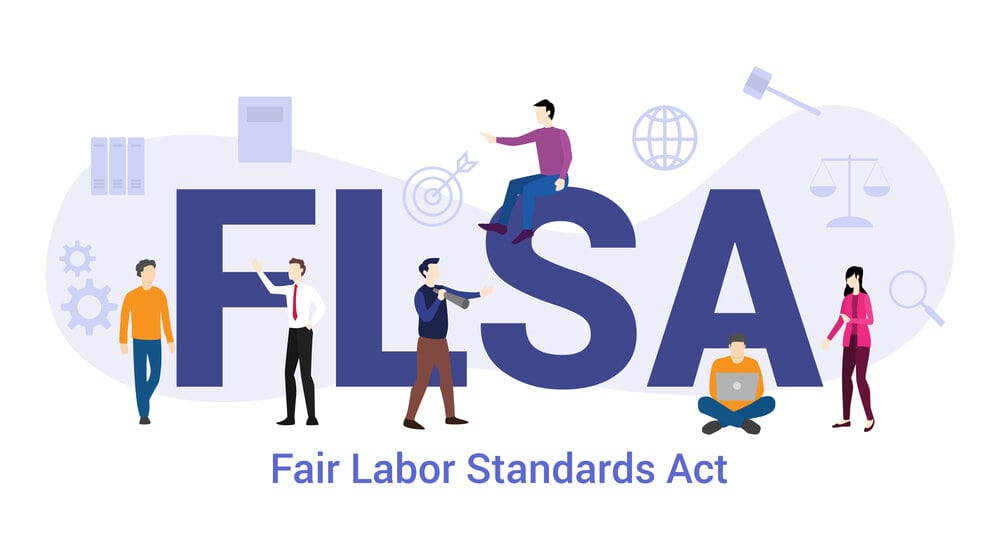In an ever-changing economy, the topic of minimum wage is perpetually relevant, especially when faced with the reality of being paid below the legal limit. As an employee, it is vital to understand the implications of receiving a wage that falls short of the mandated minimum and the potential consequences for workers and businesses involved. This article sheds light on the dynamics surrounding minimum wage violations, how to address them, and the legal recourse available for workers.
A situation where an employer pays less than the minimum wage presents multiple challenges. First, it is necessary to grasp employee rights and employer responsibilities concerning wages and recognize exemptions and common contraventions. By doing so, workers will be better equipped to tackle wage-related issues, ensure fair treatment, and identify appropriate actions to seek compensation or rectify such instances.
The impact of earning less than the minimum wage is multifaceted, affecting both the individuals involved and the overall business landscape. By discussing the consequences and presenting potential solutions, this article will delve into various aspects of minimum wage violations and provide a comprehensive understanding of this critical issue.
Key Takeaways
- Understand employer obligations and employee rights regarding minimum wage
- Recognize common wage violations and possible legal recourse for affected workers
- Acknowledge the broader impact of minimum wage infractions on individuals and businesses
Understanding Minimum Wage
The minimum wage refers to the lowest hourly pay rate that employers are legally required to pay their employees. It serves as a standard to protect workers from exploitation and provide them with a basic income level.
The Fair Labor Standards Act (FLSA) sets the federal minimum wage in the United States. As of now, the federal minimum wage is $7.25 per hour. However, states can set minimum wage rates if they meet or exceed the federal standard. For example, Maine, California, and Washington have some of the highest state minimum wages.
State minimum wages come into play when there is a difference between the federal and state rates. In such cases, employees are entitled to receive the higher of the two. State laws also determine any exceptions or exemptions from the minimum wage requirements that may exist.
The minimum wage is primarily designed to ensure that workers are paid a living wage, which is an amount that allows them to meet their basic needs. This includes necessities such as food, housing, and transportation. However, it is important to note that the minimum wage might not always meet the living wage threshold, as the cost varies across different locations.
Being paid under the minimum wage violates federal and state laws. Employers that fail to adhere to these regulations by underpaying their workers can be subject to penalties, fines, and possibly legal action. Employees can file complaints with the relevant authorities and seek compensation for lost wages.
In conclusion, understanding the minimum wage is essential for employers and employees to ensure compliance with federal and state laws while promoting fair labor practices and a reasonable standard of living.
Employer Responsibilities
Employers have to ensure their employees receive the appropriate compensation for their work. This includes adhering to the minimum wage laws set by the federal government or respective state authorities. Failure to comply with these regulations can result in severe consequences for the employer, such as fines or legal action.
One responsibility involves understanding the different classifications of workers, which impacts the minimum wage they are entitled to receive. For example, tipped employees, such as waitstaff or bartenders, may have a lower hourly wage rate. However, their overall compensation should still meet the minimum wage requirements when combining their base pay with tips received.
Additionally, employers must be aware of any specific requirements for overtime pay. This typically applies when employees work over 40 hours in a given workweek. At this point, the worker’s hourly rate should increase to at least one-and-a-half times their regular wage. This calculation should consider whether the employee is classified as exempt or non-exempt based on the Fair Labor Standards Act (FLSA).
Furthermore, employers should provide the required employee benefits under federal and state law. These may include, but are not limited to, healthcare coverage, family and medical leave, and paid time off. Offering appropriate benefits supports compliance with regulations and helps establish a positive work environment for employees to thrive.
In summary, employers must familiarize themselves with the minimum wage laws and regulations applicable to their workforce to provide appropriate compensation. This involves accurately classifying employees, adhering to overtime pay requirements, and offering necessary benefits. Complying with these responsibilities helps create a fair workplace and mitigates the risk of potential legal consequences.

Common Violations
Employers sometimes violate the minimum wage laws, resulting in workers receiving less pay than they are entitled to. One example is when employers improperly calculate an employee’s wage, combining their salary with that of other workers or failing to include overtime payment for nonexempt workers.
Another common violation occurs when employers attempt to circumvent minimum wage laws by classifying workers as independent contractors, interns, or volunteers. These misclassifications could lead to workers receiving lower wages than they should be entitled to.
Tips are also a crucial component of pay for many workers in service industries. Employers might sometimes pay tipped employees a lower wage under the assumption that tips compensate for the difference. However, when combined, the hourly wage and tips received must equal at least the minimum wage. The employer is responsible for making the difference if the total falls below the required amount.
In certain cases, fringe benefits, such as health insurance, retirement funds, or paid time off, are considered part of an employee’s compensation package. Employers might try to count these benefits toward meeting the minimum wage requirement. However, legally speaking, fringe benefits should not be included in the minimum wage calculations.
Wage payment practices can also contribute to minimum wage violations. Employers might withhold a portion of workers’ pay or delay payment, reducing their overall income to below the minimum wage.
In conclusion, violations of minimum wage laws can take various forms, ranging from miscalculations to misclassification of workers. Both workers and employers must remain informed about these regulations to ensure fair and equitable treatment for all.
Legal Recourse for Workers
When a worker discovers they are being paid below the minimum wage, there are several steps they can take to seek justice. The most immediate action is to file a complaint with the U.S. Department of Labor’s (DOL) Wage and Hour Division (WHD). This federal agency enforces the Fair Labor Standards Act (FLSA), which sets the federal minimum wage. After receiving a complaint, WHD will investigate the employer, potentially leading to the recovery of back pay for the affected workers. In addition to contacting WHD, workers can also contact their state’s Department of Labor if their state has a higher minimum wage than the federal level.
In some cases, a worker may choose to challenge their employer in court. By pursuing a lawsuit, affected employees can seek compensation for unpaid wages and additional damages or penalties. Legal action can be complicated and time-consuming, but it may be the best course for workers who have exhausted all other options.
Employers found in violation of minimum wage laws during a WHD investigation or a court trial may face penalties. These penalties vary depending on the severity of the violation and can include fines, back pay, and even criminal charges in some cases.
In summary, workers have multiple avenues for addressing situations where they are paid less than the minimum wage. They can start by filing a complaint with the WHD or their state Department of Labor and if necessary, pursue legal action in court. The enforcement of minimum wage laws helps protect workers’ rights and hold employers accountable for their actions.
Rights and Exemptions
Employees are legally entitled to a minimum wage in most circumstances. However, some notable exemptions are related to young workers, full-time students, vocational education participants, and independent contractors.
Young workers often receive a youth minimum wage, which can be lower than the regular minimum wage. This wage is typically for employees under 20 years old and applies during their first 90 days. After this period, the employer must increase the employee’s wage to the standard minimum wage.
In the realm of full-time students and vocational education, certain exemptions apply to minimum wage requirements. For instance, employers of secondary school students who are employed part-time may pay lower wages if the employee’s work is part of their educational program. Additionally, higher education students working at their institution may receive lower wages if their work is related to their field of study.
Exemptions exist for independent contractors who do not fall under the traditional employee-employer relationship. These individuals are responsible for negotiating their rates and may receive compensation equal to, or potentially lower than, the minimum wage.
Interstate commerce plays a role in determining whether federal minimum wage requirements cover an employee. If an individual’s work impacts interstate commerce, they may be subject to federal minimum wage laws even if their state has different regulations (most employment is subject to federal jurisdiction).
Employees should be aware of their rights and the exemptions that may apply. In cases where one believes they are being paid unfairly or below the required minimum wage, it is crucial to seek assistance from the appropriate labor department or legal channels to address the issue.

Impact on Workers and Businesses
The impact of being paid under the minimum wage has significant consequences for both employees and businesses. For workers, earning below the legal wage limit can result in financial stress, affecting their overall well-being and their families. Insufficient income may lead to a struggle to meet basic needs, such as accommodation, food, and healthcare.
In addition to the personal repercussions, receiving wages below the minimum wage can negatively impact employee retention rates. Workers who feel undervalued or struggle financially are more likely to seek alternative employment, leading to a high turnover rate for businesses that pay below the legal threshold. This scenario generates costs for companies due to recruiting and training new employees.
Local laws play a vital role in enforcing minimum wage standards. The actions of organizations such as HMRC ensure the compliance of businesses, and workers are encouraged to report incidences of underpayment. Failure to adhere to these regulations can result in legal consequences, such as fines and penalties, significantly affecting a company’s reputation and bottom line.
In light of the ongoing wage debate, proposals such as the Raise the Wage Act aim to incrementally increase the minimum wage, intending to improve the livelihoods of low-income families. Such legislative changes are likely to impact businesses, especially small enterprises, in terms of adjusting salaries and operational costs.
In summary, paying employees under the minimum wage harms individuals, families, and businesses. The enforcement of local laws and proposed acts, such as the Raise the Wage Act, aims to address these disparities and promote fair compensation across industries.
Independent Contractors
Minimum wage laws generally apply to employees and not independent contractors, including 1099 workers. Independent contractors are considered self-employed and responsible for setting their pay rates. They are not subject to minimum wage or other labor laws that apply to employees.
However, there are some exceptions to this general rule. In some cases, independent contractors may be classified as employees under state or federal law, making them eligible for minimum wage and other labor law protections. This can happen if the employer exercises significant control over the work performed by the independent contractor or if the independent contractor is economically dependent on the employer.
In addition, some states and localities have enacted minimum wage laws for independent contractors. For example, in California, independent contractors who work for certain types of businesses are subject to minimum wage laws under the state’s AB5 law.
Overall, applying minimum wage laws to independent contractors is a complex area of law that depends on each case’s specific facts and circumstances. Both employers and independent contractors must understand their legal obligations and rights in this area.
Self Employed Vs Employee
The main difference between being self-employed and being an employee is your level of control and independence over your work.
Self-employed individuals are business owners who work for themselves. They are responsible for finding clients, setting their rates, and managing their business operations. They have more control over their work and can schedule and work independently. They are also responsible for paying their taxes and providing their benefits.
On the other hand, employees work for a company or organization and are generally subject to more direction and control from their employer. They are typically required to work set hours and follow their employer’s specific procedures and policies. They receive a regular paycheck and may be eligible for health insurance, retirement plans, and paid time off benefits. Employers are responsible for withholding taxes from employees’ paychecks and providing certain labor law protections.
In summary, the main differences between self-employed individuals and employees are the level of control and independence they have over their work, their responsibilities for managing their business operations, and their eligibility for benefits and labor law protections.
Addressing Wage Issues
When an individual is paid under the national minimum wage, it is crucial to address the issue immediately. The first step is determining one’s employment status and understanding the difference between an employee, an independent contractor (“1099”), and a worker. This will help clarify the specific rights that apply in each case.
Note that gig work, freelance and similar are generally treated as independent, but whether that holds up legally depends on if the employer has effective control or if you are truly independent. If an employer hires a company to fix the air conditioning, the employer does not exercise any control over the materials used, who they send, the hours they work, and the like. It is temporary, and the employer exercises little to no control.
Next, an individual should attempt to discuss their wage concerns with their employer directly. This can be done through a formal meeting or by submitting a written request for payment adjustments. It is important to gather evidence of unpaid wages, including payslips and work hours documentation, to support the claim.
If the employer is unresponsive, it may be necessary to escalate the issue by filing a complaint with the local labor department or wage enforcement agency. It is essential to be aware of the statute of limitations, which might limit the time allowed to file a claim to recover unpaid wages.
Seeking legal advice from an employment attorney can be helpful, especially if the situation is complex. They can help collect the necessary evidence, represent the client’s interests, and potentially negotiate a fair settlement on their behalf. In cases where the employer has violated wage laws, an attorney can help identify potential damages such as back pay, overtime pay, and even penalties owed by the employer.
For individuals with disabilities, specific legal protections cover their wage rights. According to the Fair Labor Standards Act, some may qualify for a subminimum wage. However, this should be assessed case-by-case to ensure that disabled workers are paid fairly and according to the law.
In summary, addressing wage issues requires clearly understanding one’s employment status, open communication with the employer, and gathering evidence to support the claims. Legal assistance and the involvement of relevant labor agencies can help protect employee rights and recover unpaid wages if needed.
Frequently Asked Questions
Is it legal to pay below the minimum wage?
It is generally illegal to pay employees below the minimum wage. However, certain exceptions exist for specific categories of employees, such as students in training or workers with disabilities. Employers may be subject to penalties if found to violate wage laws.
How do employers avoid paying minimum wage?
Some employers avoid paying the minimum wage by classifying workers as independent contractors, misrepresenting hours worked, or paying employees in cash to circumvent legally mandated compensation. These tactics are unlawful and punishable by law.
When can an employer pay less than minimum wage?
Employers may pay workers less than the minimum wage under specific circumstances, such as employing apprentices or students in training programs. Additionally, workers with disabilities may be paid at a lower rate in some cases.
How to handle being underpaid by employer?
Employees who suspect they are underpaid can start by discussing the issue with their employer. If the problem persists, they may contact their local Department of Labor office or a labor attorney to address this situation.
Do tipped employees have different minimum wage requirements?
Tipped employees are subject to different minimum wage requirements. In many regions, employers may pay a lower hourly wage for employees who customarily receive tips if their total earnings meet or exceed the standard minimum wage when tips are accounted for.
What are the consequences for employers paying below minimum wage?
Employers caught paying below minimum wage can face penalties such as fines, back pay, and in severe cases, criminal charges. Additionally, companies might suffer reputation damage and difficulties retaining or attracting employees.


